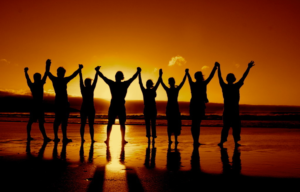 This post is part of the Hogg Foundation’s “3 Things to Know” blog series, which explains concepts influencing community mental health and our grantmaking. Check out others in this series: Health Equity, Social Determinants of (Mental) Health, Resilience and Well-Being.
This post is part of the Hogg Foundation’s “3 Things to Know” blog series, which explains concepts influencing community mental health and our grantmaking. Check out others in this series: Health Equity, Social Determinants of (Mental) Health, Resilience and Well-Being.
The Substance Abuse and Mental Health Services Administration (SAMHSA) defines recovery as “a process of change through which individuals improve their health and wellness, live a self-directed life, and strive to reach their full potential.” From this it follows that recovery integrally involves the difficult, unrelenting task of holding on to hope.
Naturally, holding onto hope looks different from person to person.That the consumer perspective resists standardization has been a stumbling block for advocates, consumers and providers attempting to integrate recovery-oriented services into mental health systems at large. Even so, the guiding principles of recovery remain a valuable touchstone for mental health research, policies and interventions that strive to put people first.
Here are three things to know about recovery:
1. Recovery is an ongoing, non-linear process that comes in many forms.
For the most part, traditional models of psychiatric care are designed to treat mental illness, rather than strengthen mental health. The desired outcome is what some call clinical recovery, or the fullest possible resolution of symptoms—an end result achieved through a combination of professional expertise and pharmaceutical treatment. For many people living with serious mental illness (SMI), this outcome in no way guarantees a fulfilling or even survivable life.
Personal recovery, as one study puts it, emphasizes that “people may not have full control over their symptoms,” but can still “have control over their lives.” In other words, what SAMHSA calls a “self-directed life” becomes viable when the capabilities, experiences and agency of an individual person, and not their diagnosis alone, shapes their path to recovery. No definitive blueprint or roadmap to recovery can exist.
A person’s road to recovery can consist of many interlocking pathways with no certain endpoint. Keeping to that path is more a matter of building resilience to life’s many ups and downs than following any uniform regimen.
2. Recovery is holistic and dependent on both clinical and community-based mental health services.
SAMHSA writes that recovery “encompasses an individual’s whole life, including mind, body, spirit and community.” This meshes nicely with the social determinants of mental health—i.e. the places where people live, learn, work, play and pray and their impact on mental health. These are sites of well-being that, in the words of Hogg Foundation program officer Rick Ybarra, “go well beyond the scope of the traditional health care encounter between provider and client.”
The argument for advancing the recovery model in mental health systems doesn’t necessarily refute the importance of formal services or trivialize the expert opinion of providers. What it does challenge is the idea that community supports like education, housing, childcare, transportation and peer support play a lesser role in assisting personal recovery.
3. Community well-being is vital to individual recovery—and vice versa.
Living a “self-directed life” isn’t the same as living a life independent of others. Meaningful social interaction and participation not only rehabilitates self-esteem, but also reinstates the sense of belonging so crucial to people who feel alienated by the trauma, symptoms, stigma or other dimensions of mental health challenges.
That kind of fulfillment goes both ways. A community doesn’t become inclusive by enforcing sameness among its members, or by ostracizing those who are different. Inclusive communities are founded on a commitment to caring for those living at their margins—and cultivating opportunities for folding them into the commons of everyday life.
Recovery, no matter how specific it may be to each person, is a health equity issue. When we create the conditions necessary for personal recovery and resilience, we do the same for our communities. As Hogg Foundation program officer Tammy Heinz says in a recent podcast, “If we truly believe that people have the ability to recover, then we can provide that hope—and we can hold it for them when they don’t have it.”
